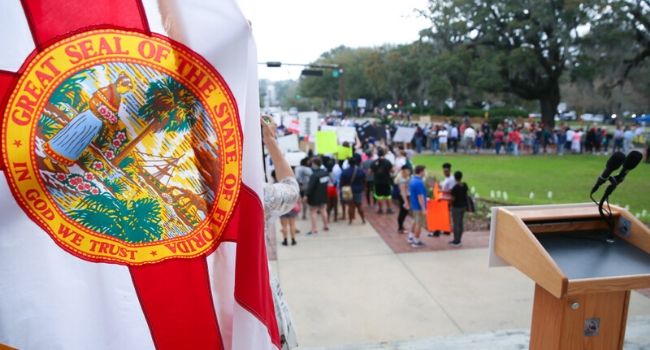
Florida Grand Jury Report Criticizes Lack of School Safety Compliance From Charter Schools
The second report scrutinizing school district compliance with Florida’s school security laws focused on district issues with emergency communications and school resource officers.
- By Haley Samsel
- December 13, 2019
A statewide report issued on Wednesday by a grand jury in Florida levied harsh criticisms against school districts that have yet to comply with new school safety laws passed after the 2018 tragedy at Marjory Stoneman Douglas High School in Parkland, Florida.
The grand jury, created by Gov. Ron DeSantis to measure how school districts are meeting new security requirements, especially focused on the failures of Broward County in its second official report. The county has been under fire over the past year for not evenly implementing regulations across all public schools, particularly charter schools that have struggled to hire school resource officers in time to meet legislative deadlines.
Charter schools have had consistent compliance problems over the past year, with school districts failing to adequately plan for the requirement to hire a school resource officer for each campus, the jury members found.
“Based on what we have heard, it appears many school districts have taken the position that charter schools are somehow outside their governance,” the report reads. “We want to make the following clear: Charter schools are public schools … If the charter schools are noncompliant with state law, it is up to their school districts to get them into compliance or revoke their charters.”
Read More: Florida Charter Schools Still Not Prepared to Employ State-Required Armed Security Officers
Jury members were frustrated with charter schools’ slow movement on the issue, arguing that there is “no conceivable set of circumstances” in which a public school in Florida should have been unprepared to hire a SRO by the beginning of the 2019-20 school year.
But the report did sympathize with charter schools’ low budgets for security officers, which for some amounted to $11,000 per year in state funding. The jury recommended that the state legislature set up a grant program for charter schools to receive more funding for school resource officers so they can meet legal requirements.
In addition to new grant funding for schools, the report recommended that a state agency -- most likely the Florida Department of Education -- be tasked with overseeing and managing local compliance with safety laws.
“Compliance will never be satisfactory if the Legislature does not take steps to designate an agency to monitor and supervise compliance,” the report reads.
Other issues addressed in the report included persistent problems with the reporting of disciplinary incidents and emergency communications. Jury members noted that Broward County, and other areas across the state, needs to settle “turf wars” between the county, the sheriff’s office and local law enforcement over who controls emergency communications.
“Evidence has shown that localization of communications is inefficient, and we believe the regional model is superior in terms of overall communications benefits.”
About the Author
Haley Samsel is an Associate Content Editor for the Infrastructure Solutions Group at 1105 Media.